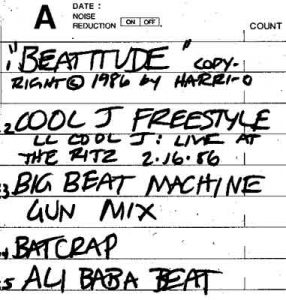So, it'd probably be at least gross oversimplification, if not outright fantasy, to imagine some Adelphi University-inspired political awakening influenced the members of Spectrum City to remobilize as Public Enemy, the Bomb Squad, and the Security of the First World (S1Ws). But it was at Adelphi that Chuck D designed the Public Enemy logo. And it was there that he and another student by the name of Harry Allen first crossed paths. Public Enemy would later dub Allen the Media Assassin, even naming him as their director of enemy relations at one point. But before Public Enemy debuted on the national stage, when Harry Allen was introduced to the Spectrum crew, he went by or was given another name, Harri-O.
Now, "Don't Believe the Hype" is generally regarded as Harry Allen's recording debut. If you've read this far, you know his appearance in the song so I won't draw this transition out any further. But what you might not know about is the time in February of 1985 or '86 when Harri-O went on Adelphi's WBAU to read an essay about apartheid in South Africa. One listener all the way up in Nyack, New York, was so moved he called the station and was connected with Harri-O himself. And so began the correspondence that forms the crux of today's post. Allen would go on to send this listener, a kid named Steve, a recording of the essay along with a trio of pause-tape beats he'd created.
Upon receiving this parcel, Steve would remix the recorded essay to Art of Noise's "Paranoimia," possibly drawing inspiration from the WBAU mainstay, Chuckie D and MC DJ Flavor's "We're Down with the DJs," which used Art of Noise's "Close (To The Edit)" as a backbeat. Steve then sent this remix, dubbed "Beatitude/Paranoimia," back to Allen. Decades later, Steve, now a self-proclaimed "archivist overlord" would upload the (unremixed) recording of the essay along with those three Harri-O beats to his Pause Button Remix site. In sharing these tracks, he referred to his remix as "dreadful, not worth publishing here."
But back then, at least on paper, Harri-O would have disagreed. He told Steve he loved the remix and offered up some suggestions. But he didn't stop there. After all, this was the 1980s. Ambitions abounded. And so Allen wrote Steve, "Let's start an indy + begin it with a release of our own stuff. Mine thus far ... and whatever rappers, suckers or criminals we decide need to be heard," a noble ambition, to be sure. The postcard continued, "I have an idea for a group (rap-punk) that would be a Just-Ice / Dead Kennedys / Fishbone cross, and of which I would be lead MC. Write back soon concerning this idea ... or just send another tape."
The correspondence would also yield a typed copy of the "Beatitude" essay "slightly revised" by Allen. Notably, its last page states that the essay was "originally presented Saturday, September 7, 1985 at the hempstead seventh-day adventist church, hempstead, ny."
Perhaps it goes without saying that the rap-punk group Harri-O envisioned never materialized. (Unless, maybe this idea evolved into Son of Bazerk? Sheer conjecture on my part.) However, as alluded to earlier, Steve did hold onto "Beatitude/Paranoimia." And I asked him for it. And here it is, definitely well worth publishing and not at all dreadful.
Which brings us back to politics. Assuming "Beatitude" was written in 1985, delivered on air in '86 and revised in 1987, it is cotemporaneous with the beginnings of Public Enemy. The group formed and recorded their first song in 1985, signed to Def Jam in 1986, and released their debut album in '87. Allen may not have been an official member of the Public Enemy/Bomb Squad/S1W collective at that point. However, he definitely shared their politics. He shared them at church and on the radio.
But then again, to call these statements political essentially misses the point. What are the politics of basic human rights? Politics of survival? The more one considers that less than 40 years ago racial segregation was the law of the land in South Africa, and that then U.S. President Ronald Reagan attempted to block legislation imposing sanctions on South Africa over apartheid, the easier it is to see political ignorance for what it truly is, a bastion of first-world privilege. "I know ... the company I work for has a branch there."


No comments:
Post a Comment